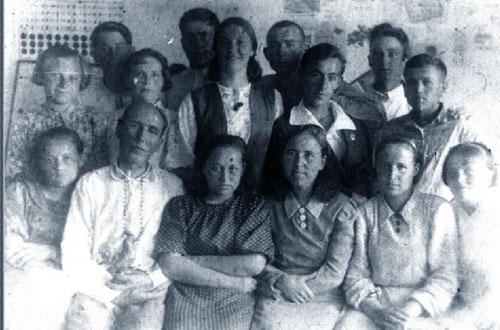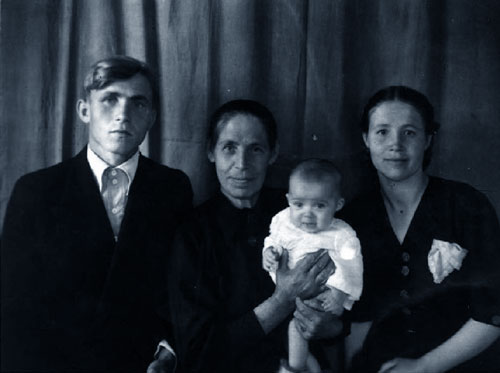









_LD.jpg) Born in 1923 in the village of Kind, Canton (district) of Unterwalden, ASSR
of the Volga-Germans. In June 1941 she finished the college of pedagogics in
Marxstadt. Deported to the Krasnoyarsk Territory in September 1941. As from 1942
she found herself as a special settler in the Ust- Yeniseysk District. During
the war she worked for the fishing industry, for the fish cannery in Ust-Port.
She lived in the settlement of Ust-Port. In 1996 L.D. Filbert and her husband
returned to the river Volga.
Born in 1923 in the village of Kind, Canton (district) of Unterwalden, ASSR
of the Volga-Germans. In June 1941 she finished the college of pedagogics in
Marxstadt. Deported to the Krasnoyarsk Territory in September 1941. As from 1942
she found herself as a special settler in the Ust- Yeniseysk District. During
the war she worked for the fishing industry, for the fish cannery in Ust-Port.
She lived in the settlement of Ust-Port. In 1996 L.D. Filbert and her husband
returned to the river Volga.
On the 19th of Juni 1941 we were celebrating our graduation ceremony in the premisses of the college of pedagogics. Three days later, the war broke out, which was the reason for fateful changes in our live. On August 31 I had a meeting with my to-be students; after lunch I learned that all Germans were to be resettled. The very same day soldiers were quarted in our school building.
At nighttime I went back to the village where my parents lived. When I arrive there everybody was grief-stricken, people were crying. On September 4 our whole family – my Mum, my brother and I – had to say goodbye to our house forever....
In June 1942 they deported us once again, takind us with the firs party of special settlers to the north by riverboat (river Yenisey). On July 1 we disembarked on the banks of the Nosonovsk Ilands, not far from the settlement of Ust-Port. We were marooned. The people sat and lay down right in the sand on the banks of the river Yenisey. A heavy storm came up, and within short everything was completely blocked up by sand. In the settlement there was a little store and some office where they accepted the delivery of fish, but there were no houses to live in. We decided to build ourselves some kind of a shelter from grass. In most cases the building work was done by women and children, for all healthy men had already been mobilized to the trudarmy. We lived in these huts from July until middle of October. At that time we organized the kolkhoz “Fisherman of the north”. We worked for the fishing industry. They had repeatedly told us: „You will find your food right in the river Yenisey!“ We continued our fishing job till the winter season, still walking through the snow all barefooted.
The first of us died on November 12. We buried him in Ladygin Yar. One of the young man was eaten up by lice – in the truest sense of the word. In December scurvy broke out. The people suffered from serious inflammations of their gums and joints. Many were affected by epidemics. Those who were still able to inch tried there best to help the others. Foodstuffs were on ly distributed until January. In order to escape starving to death the people began to cooked lemmings and eat them.

During the first winter twenty people died from hunger or scurvy. It was the worst winter of all. In March we were delivered reindeer blood and some brew made of fir needles. And then we were all forced to drink up half a glassful of this bitter mixture. Mum and my brother grew seriously ill, as well, but I miraculously remained unaffected.
Mum saved me and my brother from starving. She would knit warm clothes from the wool she had managed to brng along from the Volga, and then she traded them in for foodstuffs. Strange to say, what different kinds of labour we had to fulfill: we went to procure ice floes from the Yenisey, carried turf and coal on our shoulders. It was a hard life, but we all lived hoping that after the end of the war, everything would be put straight again and that we would then be able to return to our previous homes. We were all the time thinking: „What will happen to our houses, our little farms on the river Volga without us taking care of them?“.
The settlement of Ust-Port was represented by thirteen nationalities in all. They all lived together in good terms.
In 1948 we were forced to sign a document which said that we would never been allowed to leave for the Volga, that we were assigned to live in this place for ever. In 1956, however, many special settlers left for their previous home villages, most of the Germans, however, stayed. There was no place left where they could have returned to.

This is me and my aged mother – Therese Andreevna Karle*; we were often
dreaming of our village, our house on the volga ... I had gladly returned to
this place, but our house did not exist anymore ...
Recorded in the settlement of Ust-Port in the spring of 1991
* Theresea Andreevna Karle died in the settlement of Ust-Port in the autumn of 1993 at the age of 95. The museum is in possession of her spinning wheel, which she had managed to take along from the Volga to Siberia. The spinning wheel saved the lives of the family, when they lived in exile far beyond the polar circle.